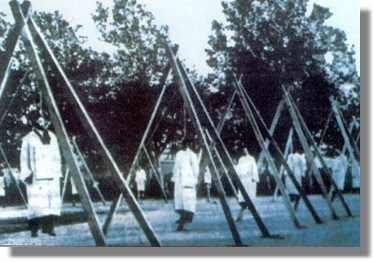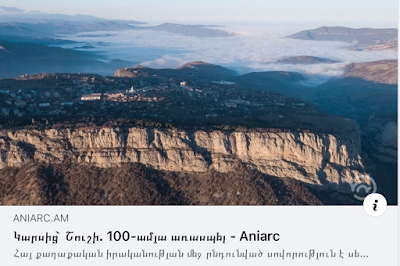I have attached my abridged translation of the naive introduction to the “The Armenian’s Songbook" (Hayoun Yergaran), Hmayag Aramiants compiled in 1911 in Constantinople. He was a staunch believer of the socialism, the Social Democrat Hnchakian Party espoused. He was similarly enamored by the promise of the Ottoman Constitution and ardently believed in its slogans of Freedom, Equality, Justice and Fraternity. He must have been so upset when he learned that Hnchakian's party not only saw a virulent racism behind the slogans of comradeship the new Turkish order proclaimed but also determined to assassinate its principles, Hmayag Aramiants betrayed his own party, to salvage the promise of socialism of the new order, albeit Turkish. The apparent mindset in his introuduction appears to be endemic of the Armenian denizens in the Ottoman Empire just before the genocide. They bared themselves to the Constitutional Ottoman authorities, a Turkish order nonetheless. Such was the compilation of this song book that he praised those who raised arms against the Hamidian oppressive regime, but a Turkish regime none the less, believing that the new Turkish order will not only understand, but appreciate.
His betrayal of his party led to public hanging of twenty Hnchakian leaders, decimating the Hnchakian party. Arshak Yeztanian, a member of thje Armenian Revolutionay Federation, sanctioned by the Nemesis Operation, assassinated Hmayag Aramiants in Constantinople.
Those interested by read the tale of the songbook he compiled, and about his betrayal, may check the two links listed below. Vahe H. Apelian
 |
| Celebrating Ottoman Constitution. The Banners on the right and on the left read are inscribed in Armenian |
“Only recently, when I decided to give the Armenian public the historical summary of the Social Democrat Hnchakian Party from 1887-1911, I noticed that it would be more beneficial to highlight the many songs written about Armenian Revolutionary Heroes of that period in a separate publication.
In addition, when I had in front of me a number of newly published songbooks, both in Dajikistant (Turkey) and abroad, I saw that not only our latest revolutionary epic was not properly presented in them, but also many songs were distorted, corrupted, and some of them were outright degutted of their true message. This was true in particularly for the Hnchakian's songs. They have been subjected to ugly manipulations.
Therefore, I considered it necessary to collect, do a light proofreading remaining, as much as possible, faithful to their true meaning and spirit of the songs; transcribe and publish them in the present "THE ARMENIAN’S SONGBOOK”. I like to believe that it will, more or less, satisfy the legitimate demand of the lovers of Armenian songs.
I have no illusion, of course, to present this as a complete work, because in addition to the difficulties of the work, some external obstacles were also created. Foolish efforts and non-benevolent sentiments were directed against the lofty goals of the Armenian Revolutionary songs in the pretext that it pitted them against the collective motherland (note: Turkey) and its constituents. Such sentiments are not only sad, but outright ugly.
I tried to push all such sentiments away considering that the patriotism of the nations is their highest mission to cast it under any doubt. In my opinion, a nation like ours living under the Hamidian regime and waging a struggle of existence against it, could not have a different outlook, and could not have charted a different political path than what the well-known history of the Armenian Revolution shows.
Armenians facing forced assimilation and Armenocide, conditioned their right to a decent living by adhering to a separate fate for Armenia than the one imposed by the state policies of Sultan Hamid. Those sentiments are clearly expressed in the folk songs that not only do not betray true patriotism, but also are living proof of Armenians’ political maturity. and to its noble political courage, until the state organization was subjected to a radical reform, and with the introduction of the constitutional egalitarian system that forced all the subjects of the vast Ottoman Empire to unite around a nationwide constructive work, under the noble banner of Freedom, Equality, Justice and Fraternity, putting an end to all kinds of discrimination and instilling in its constituent nationalities a soul-stirring love, respect and self-sacrifice towards the Motherland and its future. Thus, the living sentiments of righteous Anger and National Self-Determination against the dictatorial regime can never disturb the peace of mind and the tranquility of the souls of its free citizens in a free country, whether they are public officials, whether they are servants of the law or ordinary citizens.
For me, the songs of a nation are inviolable sanctities, as much as history itself is with its various manifestations. There should never be an obstacle to their pristine preservation, just as it should not occur to anyone in the preservation of this or that episode historical history, even if it is not in line with current understandings.
That was the reason why I made every effort to compile in the "The Armenian’sSongbook”. Some of the songs have appeared in various editions while some other songs have remained obscure. The reader will form an opinion about the compilation when he or she peruses the songbook.
Notes:
The Armenian's Hymnal: http://vhapelian.blogspot.com/2017/04/tale-of-armenian-hymnal.html
Hmayag Aramiants: http://vhapelian.blogspot.com/2020/04/tale-of-armenian-hymnal-22-betrayal-and.html







